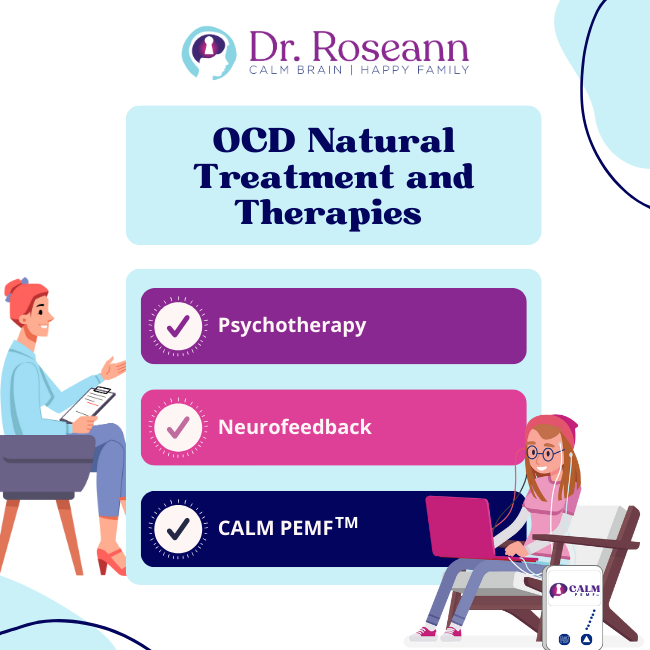Obsessive-compulsive disorder, or OCD, is characterized by unwanted thoughts and fears that trigger behaviors that get in the way of a person's everyday life. Different people experience OCD in different ways.
OCD involves rituals, intrusive thoughts, and compulsive behaviors. Although closely associated with anxiety, they're different because anxiety is rooted in a real event. OCD, on the other hand, often involves an illogical fear. Even if it stemmed from a real event, the fear becomes completely illogical. Because of this fear, the person is urged to perform compulsive rituals to feel relieved.
OCD patients are plagued with compulsive behaviors, negative emotions, and intrusive thoughts, making their life difficult. Their intrusive thoughts spiral out of control and consume their thinking. They have difficulty connecting, focusing, and doing simple tasks because their brains are in constant fear.
People with OCD can appear “normal and fine” and often are highly functional, but their intrusive thoughts and compulsions can fluctuate in intensity and dominate their thoughts. Because OCD is internal, it is hard to see the impact. Physical signs include gastrointestinal symptoms, sleep problems, or repetitive behaviors.
Students with OCD may look like they're doing well in school but are struggling internally. They may exhibit perfectionistic tendencies, have frequent erasures, and spend excessive time completing schoolwork and homework. They may become overwhelmed by the stress caused by their hijacked brain and its constant inner chatter.
OCD Symptoms: Examples of Obsessions and Compulsions
Here are some types of OCD and an example of their common obsessions and compulsions. Various people experience different symptoms of OCD, depending on their triggers.
Type: Harm
OCD Obsession: fear of deliberately harming yourself or othersCompulsion: Excessive praying and hanging on to religious items
Type: Checking OCD
Obsession: fear of making a mistake or leaving something out that can cause misery
Compulsion: Repeated checking if the doors and windows are locked
Type: Contamination OCD
Obsession: fear of acquiring a disease or infection
Compulsion: Constant hand washing or showering
Type: Symmetry OCD
Obsession: fear of being messy or chaotic that may cause a more significant problem
Compulsion: Ensuring that all items are aligned and pointing the same way
Stress and the Brain
Inflammation persists as a result of chronic stress. Stress-induced chronic inflammation can contribute to or exacerbate physical and mental health problems like OCD, PANS/PANDAS, and anxiety disorders. Stress can affect neural circuitry, cognition, decision-making, and mood. It can also increase or decrease the expression of certain behaviors. These imbalances affect systemic physiology, particularly the neuroendocrine, autonomic, immune, and metabolic processes (McEwen, 2017).
Additionally, research has shown that stress affects certain brain regions. In particular, it reduces prefrontal cortex gray matter volume. This gray matter controls emotions, memory, critical thinking, and movement. It also facilitates information processing. As stress reduces gray matter volume, all these processes are affected.
OCD and Stress
OCD has been associated with stressful and traumatic events. Compounded stressors can contribute to the development of OCD. When a stressor happens, we develop healthy or unhealthy ways of dealing with it. For many, anxiety can develop, and for others, obsessive thinking can start. A negative reinforcement cycle leads to behavioral habituation in the brain of obsessive or compulsive behaviors.
Moreover, stress can trigger OCD in genetically vulnerable individuals. If any of your family members has OCD, their close relatives exposed to stressful life events are more prone to developing it.
Some people reported that they developed OCD after experiencing stressful events throughout the year. For example, one case reported was of a 77-year-old woman with a typical cerebral structure diagnosed with OCD following stressful life events (Velayudhan & Katz, 2006). Trauma can lead to various mental health issues, including anxiety, panic attacks, OCD, and PTSD.
Stressful events can trigger OCD, such as interpersonal traumatic events involving emotional abuse, family violence, neglect, and rejection. Specific traumas caused by a natural disaster or witnessing a crime are not known to trigger OCD, but trauma can lead to clinical issues.

Stress will likely make your OCD symptoms worse if you have it. It could suddenly make one's compulsive behaviors or intrusive thoughts more potent and harder to manage. Negative thoughts are harder to ignore if you're already anxious or suffer from other mental health conditions.
Dealing with Stress if you have OCD
There is a strong correlation between OCD symptoms and stress. The symptoms of anxiety or depression often worsen or become more challenging to manage when people are upset or worried about something. Many people with OCD experience heightened fear, uncertainty, or stress about finances or personal situations.
OCD sufferers can be adversely affected by this stress, and stress can cause OCD symptoms to appear more often or feel more intense. Managing repetitive thoughts, compulsive behaviors, and irrational fears can take a lot of effort. A new thought pattern, anxiety, or behavior may also appear.
That is why it is important to get the right OCD treatment, so you have tools in your toolkit to talk back to your OCD. Understanding your thoughts vs. your OCD brain is key to getting better.
OCD Natural Treatment and Therapies

The treatments for an obsessive-compulsive disorder may not entirely cure the condition. Still, they can significantly help control the symptoms so that they don't interfere with one's daily activities. An OCD therapy may have to be ongoing, long-term, or intensive, depending on its severity.
Leading a healthy lifestyle can reduce stress and improve mental and physical health. For example, get enough sleep, eat well, and exercise regularly. Doing these will also improve your mood, which alleviates OCD symptoms as well.
Learning to tolerate and not fear stressors will teach your brain you are in charge, not your OCD. Awareness of your triggers is part of the healing process, so you can learn to expose yourself to them safely.
Learning how to confront your triggers with the support of the people around you and not avoid them or seek reassurance is how one gets better from OCD. Most parents make the mistake of accommodating OCD by allowing a child to avoid their fears or seek reassurance.
Learn how to manage stress healthily. Feeling anxious or upset is normal, but it pays to know how to cope appropriately. Taking time for yourself, talking to a friend, practicing mindfulness, walking around the neighborhood, or listening to music but not avoiding fears is how to take control of the OCD.
Other natural, non-invasive therapies backed by science may also be used to address stress and OCD. Your mental health professional may recommend the following:
1. Psychotherapy
Many people with OCD can benefit from CBT or cognitive behavioral therapy, particularly ERP or Exposure and Response Prevention therapy. ERP is a form of cognitive behavioral therapy that involves gradually exposing the OCD sufferer to the object or situation they fear to learn ways to resist their compulsions.
ERP is considered to be the gold standard for the proper treatment of obsessive-compulsive symptoms. Once OCD sufferers learn how to address their fears and take control of their compulsions and obsessions, they will enjoy a better quality of life. CBT works on OCD only in the combination of exposure therapy as with ERP.
It is important to note that anxiety therapy is inappropriate for OCD and can actually reinforce and worsen OCD symptoms because of the way OCD behaviors get reinforced in the brain. Working with a true OCD professional such as our team or from IOCDF is paramount in getting your child better.
Parents must assist their children in breaking their OCD cycle during exposure therapy sessions and at home by not allowing for avoidant and reassurance behavior. Providing too much comfort and not reinforcing coping skills is a surefire way to worsen OCD symptoms.
Instead of reinforcing the child's compulsions, intrusive thoughts, and anxieties, ERP teaches parents and kids how to cope. Parents learn what to say or do when stress triggers OCD behaviors. As a result of ERP, parents become more confident in helping their kids deal with their anxieties.
2. Neurofeedback
Children with OCD can achieve a relaxed, parasympathetic state through neurofeedback. The child will start to think differently and perform positive actions in such a state. However, stress and hyperactivity prevent the child from thinking, paying attention, and taking action, and for someone in such an activated state as with OCD, that makes psychotherapy nearly impossible.
As stress hijacks the brain, it gets stuck in a repetitive loop of having obsessive thoughts and compulsive behaviors. Because neurofeedback subconsciously calms the brain, it is a very effective treatment for OCD.
Coaching and OCD therapy help children manage their persistent thoughts and fears more effectively. A calm brain and nervous system allow the child to respond appropriately to stimuli and make therapy more effective. It gives kids and teens the space to do the work in ERP therapy as they confront their fears with exposure.
As a result, they gain skills to take control of their OCD, and there will be fewer obsessions, compulsions, and intrusive thoughts. The child will also be less irritable and angry. They can demonstrate calm thinking, engaging behaviors, the capability to think and act without becoming stuck, and self-confidence in their ability to confront their fears.
3. CALM PEMF™
Another essential tool that we use to support those with OCD is PEMF therapy to calm the brain and help a person with OCD be able to reduce mental and physical stress. Pulsed electromagnetic fields stimulate nerve cells to function optimally, act more efficiently, and communicate better.
CALM PEMF™ enhances the cellular functions of body organs by altering their bio-electromagnetic fields. PEMFs penetrate the bones, organs, tissues, and cells at low frequencies without changing or absorbing them.
Tissues are stimulated electrically and chemically upon passing through. Using CALM PEMF™ improves the health and function of cells by improving cellular energy. It allows the body to process chemical and electrical exchanges and addresses dysfunctions and imbalances, resulting in enhanced adaptability and natural healing.
Citations
McEwen, B. S. (2017). Neurobiological and Systemic Effects of Chronic Stress. Chronic Stress, 1(1), 247054701769232. https://doi.org/10.1177/2470547017692328
Velayudhan, L., & Katz, A. W. (2006). Late-onset obsessive–compulsive disorder: the role of stressful life events. International Psychogeriatrics, 18(2), 341–344. https://doi.org/10.1017/s1041610205002735
Always remember… “Calm Brain, Happy Family™”
Are you looking for SOLUTIONS for your struggling child or teen?
Dr. Roseann and her team are all about solutions, so you are in the right place!
There are 3 ways to work with Dr. Roseann:
You can get her books for parents and professionals, including: It’s Gonna Be OK™: Proven Ways to Improve Your Child’s Mental Health, Teletherapy Toolkit™ and Brain Under Attack: A Resource For Parents and Caregivers of Children With PANS, PANDAS, and Autoimmune Encephalopathy.
If you are a business or organization that needs proactive guidance to support employee mental health or an organization looking for a brand representative, check out Dr. Roseann’s media page and professional speaking page to see how we can work together.
You can get her books for parents and professionals, including: It’s Gonna Be OK™: Proven Ways to Improve Your Child’s Mental Health, Teletherapy Toolkit™ and Brain Under Attack: A Resource For Parents and Caregivers of Children With PANS, PANDAS, and Autoimmune Encephalopathy.
If you are a business or organization that needs proactive guidance to support employee mental health or an organization looking for a brand representative, check out Dr. Roseann’s media page and professional speaking page to see how we can work together.
Dr. Roseann is a Children’s Mental Health Expert and Therapist who has been featured in/on hundreds of media outlets including, CBS, NBC, FOX News, PIX11 NYC, The New York Times, The Washington Post,, Business Insider, USA Today, CNET, Marth Stewart, and PARENTS. FORBES called her, “A thought leader in children’s mental health.”

She is the founder and director of The Global Institute of Children’s Mental Health and Dr. Roseann Capanna-Hodge. Dr. Roseann is a Board Certified Neurofeedback (BCN) Practitioner, a Board Member of the Northeast Region Biofeedback Society (NRBS), Certified Integrative Medicine Mental Health Provider (CMHIMP) and an Amen Clinic Certified Brain Health Coach. She is also a member of The International Lyme Disease and Associated Disease Society (ILADS), The American Psychological Association (APA), Anxiety and Depression Association of America (ADAA) National Association of School Psychologists (NASP), International OCD Foundation (IOCDF) International Society for Neurofeedback and Research (ISNR) and The Association of Applied Psychophysiology and Biofeedback (AAPB).
© Roseann-Capanna-Hodge, LLC 2023
Disclaimer: This article is not intended to give health advice and it is recommended to consult with a physician before beginning any new wellness regime. *The effectiveness of diagnosis and treatment vary by patient and condition. Dr. Roseann Capanna-Hodge, LLC does not guarantee certain results.













